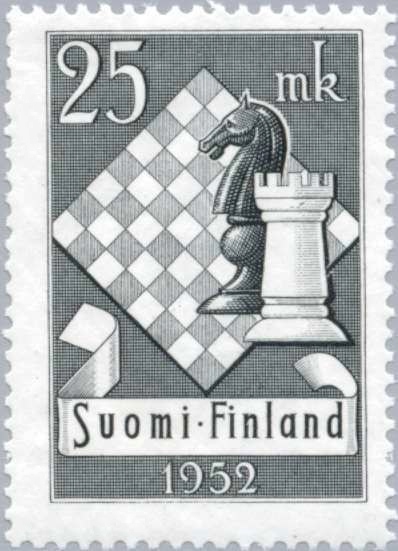1952 Chess Olympiad on:
[Wikipedia]
[Google]
[Amazon]
 The 10th
The 10th
10th Chess Olympiad: Helsinki 1952
OlimpBase {{Chess Olympiads 10 Olympiad 10 Chess Olympiad 10 Olympiad 10 Chess Olympiad 10 1950s in Helsinki August 1952 sports events in Europe
 The 10th
The 10th Chess Olympiad
The Chess Olympiad is a biennial chess tournament in which teams representing nations of the world compete. FIDE organises the tournament and selects the host nation. Amidst the COVID-19 pandemic, FIDE held an Online Chess Olympiad in FIDE Onli ...
(; ), organized by the FIDE
The International Chess Federation or World Chess Federation, commonly referred to by its French acronym FIDE ( , ), is an international organization based in Switzerland that connects the various national chess federations and acts as the Spor ...
and comprising an openAlthough commonly referred to as the ''men's division'', this section is open to both male and female players. team tournament, as well as several other events designed to promote the game of chess
Chess is a board game for two players. It is an abstract strategy game that involves Perfect information, no hidden information and no elements of game of chance, chance. It is played on a square chessboard, board consisting of 64 squares arran ...
, took place between August 9 and August 31, 1952, in Helsinki
Helsinki () is the Capital city, capital and most populous List of cities and towns in Finland, city in Finland. It is on the shore of the Gulf of Finland and is the seat of southern Finland's Uusimaa region. About people live in the municipali ...
, Finland.
The Olympiad was especially notable for the debut of the Soviet team, who instantly won their first gold medals and went on to completely dominate the Olympiads for the next four decades.
After the tournament, it was generally agreed that the small preliminary and final groups of only 8–9 teams left too much open to chance, since a single blunder would have an impact too big on the final standings. Consequently, FIDE decided that in the future, no final should have less than 12 participants.
Results
Preliminaries
Twenty-five teams entered the competition and were divided into three preliminary groups of eight or nine teams. The top three from each group advanced to Final A, the teams placed fourth-sixth to Final B, and the rest to Final C. All groups and finals were played asround-robin tournament
A round-robin tournament or all-play-all tournament is a competition format in which each contestant meets every other participant, usually in turn.''Webster's Third New International Dictionary of the English Language, Unabridged'' (1971, G. & ...
s.
Group 1 was won by Argentina, ahead of West Germany and Czechoslovakia. England, Denmark, and Cuba took the following places, while Iceland, Saar, and Luxembourg finished in the bottom third.
Sweden took first place in group 2, ahead of Hungary and Yugoslavia. East Germany, Austria, and Italy took places four through six, while Brazil and Norway finished seventh and eighth.
Group 3 was won by the Soviet Union, well ahead of the United States and the Finnish hosts. Israel, the Netherlands, and Poland took the following places, while Switzerland and Greece finished at the bottom.
Group 1
Group 2
Group 3
Final
: : :Final A
Final B
Final C
Individual medals
* Board 1:Miguel Najdorf
Miguel Najdorf ( ; born Mojsze Mendel Najdorf; 15 April 1910 – 4 July 1997) was a Polish-Argentine chess grandmaster. Originally from Poland, he was in Argentina when World War II began in 1939, and he stayed and settled there. He was a leadin ...
12½ / 16 = 78.1%
* Board 2: Vassily Smyslov 10½ / 13 = 80.8%
* Board 3: David Bronstein
David Ionovich Bronstein (; February 19, 1924 – December 5, 2006) was a Soviet chess player. Awarded the title of International Grandmaster by FIDE in 1950, he narrowly missed becoming World Chess Champion in World Chess Championship 195 ...
8 / 10 = 80.0%
* Board 4: Čeněk Kottnauer
Čeněk Kottnauer (24 February 1910, Prague – 14 February 1996, London) was a Czech British chess master, earning the title of International Master.
At the beginning of his career, he tied for 11-12th at Prague 1933 (''Kautsky Memorial'', Ka ...
12½ / 15 = 83.3%
* 1st reserve: HĂ©ctor Rossetto
HĂ©ctor Decio Rossetto (8 September 1922 in BahĂa Blanca, Argentina – 23 January 2009 in Buenos Aires) was an Argentine chess player.
He earned the title of International Master in 1950 and the Grandmaster title in 1960.
He was a five-time ...
8 / 10 = 80.0%
* 2nd reserve: Ludwig Rellstab 6½ / 9 = 72.2%
References
10th Chess Olympiad: Helsinki 1952
OlimpBase {{Chess Olympiads 10 Olympiad 10 Chess Olympiad 10 Olympiad 10 Chess Olympiad 10 1950s in Helsinki August 1952 sports events in Europe